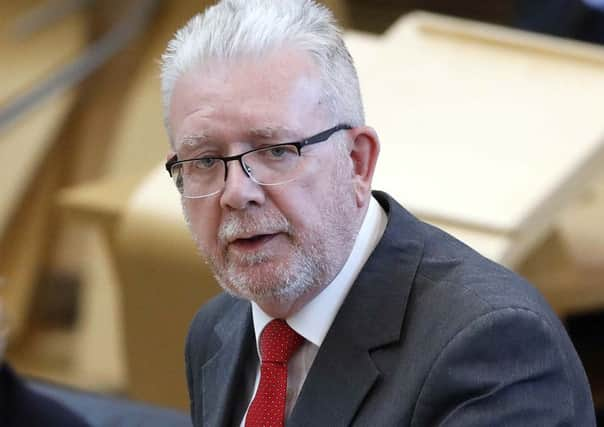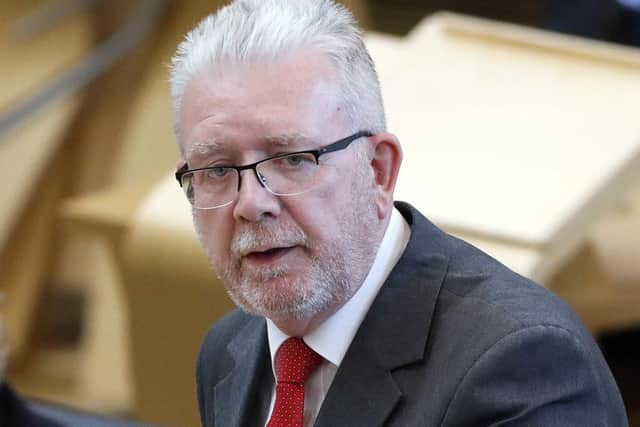Tom Peterkin: Nicola Sturgeon left in splendid isolation over Brexit '˜power grab'


In the last 15 years or so, we have been spoilt for choice when it comes to being exposed to tedious, navel-gazing exercises set up to give Holyrood more teeth. There has been the Calman Commission, the Smith Commission, the fiscal framework, various Scotland Acts and, most recently, the question of how to distribute EU powers following the Brexit vote. It was the Calman Commission, set up by the pro-Union parties some years ago, that one cynical journalist nicknamed the Calpol Commission, because it made him sleep as soundly as a baby.
But this tortured journey through impenetrable process and repetitive arguments has not been entirely soporific.
Advertisement
Hide AdAdvertisement
Hide AdThere have been flashpoints of excitement and activity, most notably the establishment of devolution itself and the 2014 independence referendum.


This week saw a development that, while perhaps not a flashpoint, was highly significant when compared with the routine squabbling that characterises the mundane end of the constitutional debate.
Nicola Sturgeon’s decision to go out on a limb and reject the UK Government’s offer to resolve the row over how EU powers are divvied up after Brexit will have ramifications for the future. A frisson of excitement could be felt at Holyrood when it emerged that the Scottish Government was intent on playing hard ball with UK ministers.
The frisson intensified when news came through that the Welsh Government had taken the opposite view and decided that the concessions offered by the UK Government were enough for the Labour administration in Cardiff to accept a powers deal.


Until then, the Scottish and Welsh Governments had presented a united front. They had both insisted that all repatriated powers in devolved areas should be transferred to the Scottish Parliament and Welsh Assembly.
This was originally unacceptable to Theresa May’s Government whose priority has been to protect the UK internal market by creating common frameworks across the UK in policy areas such as food labelling, animal health, agriculture, fishing and chemical regulation.
The UK Government was unwilling to give the devolved countries a potential veto over legislation that could threaten the internal market. In the opposite corner, the Scottish and Welsh governments argued that failure to hand over all the powers ‘in devolved areas’ would undermine devolution.
As Ms Sturgeon and her Brexit minister Michael Russell complained vociferously about Holyrood being the victim of a “power grab”, inter-governmental talks were held in an attempt to break the impasse.
Advertisement
Hide AdAdvertisement
Hide AdFacing pressure from the SNP, Labour in Wales, and even the Scottish Tories, the UK Government offered a compromise that would see the powers passed directly to the devolved institutions.
Around 25, however, would be “frozen” temporarily so that a common UK-wide framework could be established.
This was good enough for the Welsh Government, but not good enough for the Scottish Government.
The official line from UK Brexit Secretary David Davis may be there is still hope the differences can be overcome, but the reality is that there is little wriggle room for further concessions from the UK Government because going down that road would anger the Welsh. Meanwhile Ms Sturgeon will be anxious to avoid anything that looks like a humiliating volte-face. Adding to the intrigue was the suggestion that Mr Russell, who has struck up a constructive relationship with Welsh finance secretary Mark Drakeford, was keen on doing a deal but was overruled by Ms Sturgeon.
Mr Russell has denied that was the case. But whatever the internal machinations of the SNP administration, the question is why is Ms Sturgeon so determined to stand in splendid isolation?
Ms Sturgeon’s opponents believe the SNP leader has calculated that her uncompromising stance will appeal to her hard-core support and is driven by her desire to use Brexit to trigger another Scottish independence referendum. Instead of accepting the UK Government compromise and dressing up the concessions as an SNP victory, she appears intent on winding up the grievance machine and blaming the stalemate on Westminster intransigence.
That approach will resonate with the hard-core activists in her party who are already involved in a depute leader contest dominated by the indyref2 question. Ms Sturgeon and co will play to their activists and hope that her argument that the solution to Brexit is Scottish independence will gather steam. Of course, this approach risks alienating those who would rather Scotland tries to make the best of Brexit rather than getting bogged down in yet more constitutional controversies. Therein lies the weakness of Ms Sturgeon’s isolated position. It appeals to those who are already convinced of the merits of Scottish independence but not further afield.
Furthermore, no matter how hard the First Minister bangs the indyref drum, the UK Government will stick to its position that one cannot be held while there is uncertainty about the options on offer. With Brexit scheduled for spring next year and a 20-month transition period to follow, Ms Sturgeon’s opponents still believe that a second referendum can be parked until after the 2021 Scottish election. But expect more sound and fury in the meantime.
